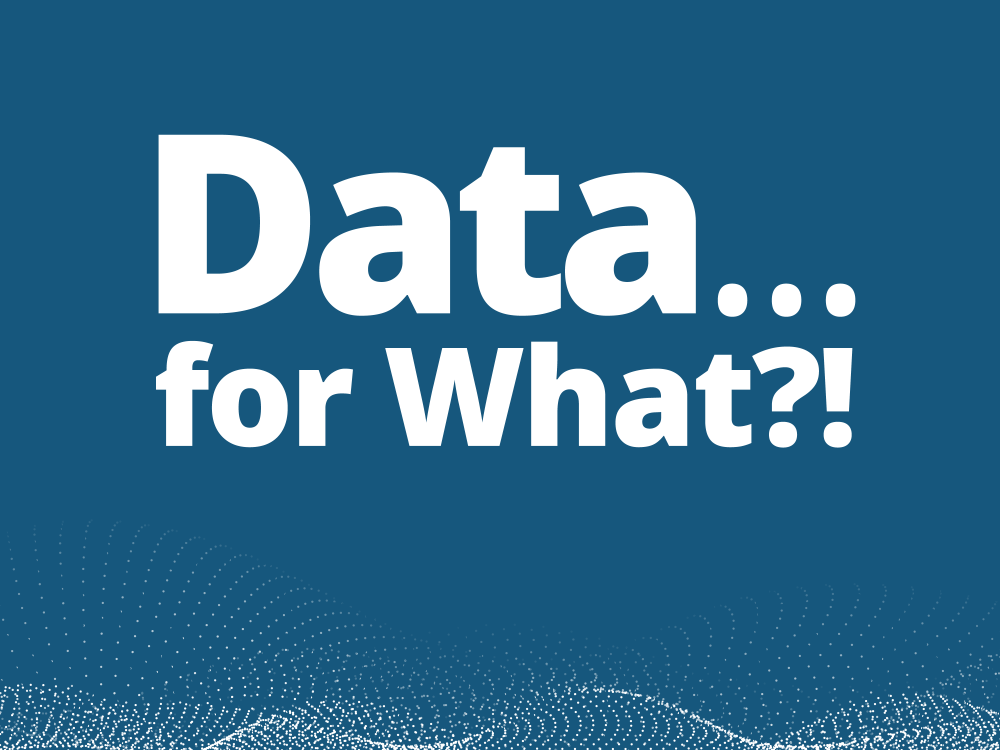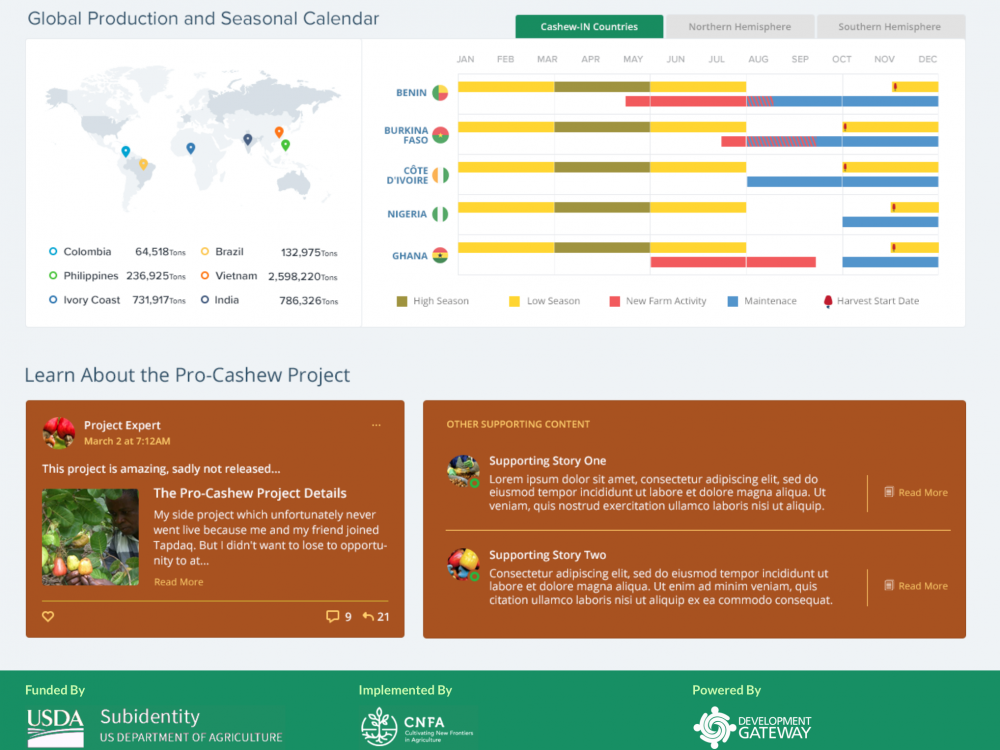Using Data to Build Health Resilience From the Ground Up in Côte d’Ivoire
Through a dashboard providing information on priority health centers in Abidjan, users better understand how patients are moving through the system and where additional training is most needed.
Background
Across Abidjan, PEPFAR priority health facilities have varying levels of technical capacity, data infrastructure, and management practices to access patient health data.
Des Chiffres et Des Jeunes (DCDJ), led by Development Gateway and funded by the MCC-PEPFAR Data Collaboratives for Local Impact (DCLI) Program, has developed an initiative to address these disparate data needs and collect all priority health center data in one central location. Called the “23/23 Initiative,” this work addresses specific data gaps in each priority site and determines what types of training, targeted placement of Data Fellows, and improvement of data systems would lead to better performance and outcomes of each site. It has connected 23 fellows with 23 priority health sites to improve awareness about the value of data, systems and decision-making, and to make each center more efficient to better serve communities.
Overall, DCLI is designed and managed by MCC and funded by PEPFAR, and aims to empower individuals, communities, and organizations, including stakeholders in subnational areas, to use data to improve lives, contribute to ending HIV/AIDS, and help address local development needs and priorities. The 23/23 Initiative is hyper-local, focused on the data needs of priority sites and healthcare workers to work more effectively.
Problem
When DCDJ Data Fellows were placed at each of the 23 priority health facilities in Abidjan, they immediately observed opportunities to strengthen data collection, management, and use at the sites. It was clear that a one-size-fits-all solution to improving data use in each priority healthcare site would not be sufficient to address unique issues like inconsistent patient management techniques, patients that have faced an Interruption In Treatment (IIT), and a time-consuming emphasis on data entry and reporting “up” – instead of time and effort to derive insights for local use.
The Data Fellows confirmed that basic data skills are lacking at health centers in Abidjan, and that health workers do not have the resources to solve their day-to-day challenges. They found that a centralized data source would be a useful tool for deriving locally-relevant insights.
Solution
Twenty-three Data Fellows surveyed key constraints of data use in each facility. Based on survey results, the DCDJ team worked to co-create tools and solutions to address gaps around data in the priority sites and to determine whether training (of clinic staff and related stakeholders), placement of Data Fellows, and improvement of data systems at the local level can lead to better performance of these health centers.
Building on survey results, the Fellows determined that a national health site performance dashboard would bring critical information together to better manage appointments, IIT treatment plans, and patient information. When scaled up across all priority health sites in Côte d’Ivoire, it would present KPIs and trends, visualize local pharmacy inventory, and enable pharmacy records reconciliation.
Process
The process to build the dashboard started in early 2020. The DCDJ team and the Fellows worked closely with health facility personnel to understand their needs and priorities related to patient information, create “test” data to understand the tools, and gather detailed feedback. To build the tool, the team also worked in partnership with the Côte d’Ivoire Directorate of Informatics and Sanitary Information (DIIS), which collects and manages health data at the national level.
The team built a dashboard that shows breakdowns of patients that have faced an IIT and have recovered, or have begun to seek treatment elsewhere. For PEPFAR, tracking IIT patients is essential to increasing the overarching quality of care for HIV/AIDS patients. The system also compares healthcare facilities side-by-side, to best track patients’ treatment plans. Building the tool also required close coordination with the DIIS, because much of the data required for this dashboard is owned by DIIS – and Dashboard would also provide its personnel with added insight on which health facilities are meeting their targets and which need assistance. The tool was built using PowerBI, a standard data analytics software that enables an API to interface with the DIIS’s own systems, as well as with OpenMRS, which is a facility-level patient information portal including medical registration, patient addendums, and administrative information.
Outcomes & Impacts
The dashboard enables health facilities to track patients’ treatment progress, and is used to help bring people who had abandoned treatment back to their treatment plans – a key priority for both DIIS and PEPFAR.
Despite potential slowdowns due to COVID-19, DCDJ Data Fellows have continued to build out the dashboard, provide remote training, and analyze data using the tool. Doing so has had huge impacts on the health system in Côte d’Ivoire – the more individuals enrolled in active treatment, the healthier the country becomes as a whole.
The dashboard also enables PEPFAR to target interventions more specifically towards groups that are most often being marked as IIT, and monitoring & evaluation is underway to compare effectiveness across facilities that do and do not receive its support.
Finally, working directly with data in OpenMRS, users of the health facility dashboard can derive more useful key insights on data use, not only nationally but all the way down to facility level. Paired with the opportunity to scale the dashboard beyond the current 23 implementation sites to all health facilities in Côte d’Ivoire, this initiative has the potential to improve the availability and usefulness of health data across the country.
Share
Related Posts

Episode 3, Season 1 | Geography: Expanding & Deepening DG’s Regional Footprint
In Episode 3 of "Data… for What?!", Development Gateway’s new podcast, we explore how we are prioritizing our geographical focus in the coming years. Conversations with Vanessa Baudin Sanchez, Carmen Cañas, and Charlene Migwe-Kagume highlighted the opportunities and challenges of expanding our portfolio in Central America and deepening our work and partnerships in West, East, and Southern Africa.

Lancement du prototype de la plateforme Cashew-IN
Des données exhaustives et fiables peuvent contribuer à accroître les profits, à réduire les pertes ainsi qu’à améliorer la compétitivité des agriculteurs, des producteurs, des transformateurs et des autres acteurs du secteur de la noix de cajou. Development Gateway (DG) s’est associé à Cultivating New Frontiers in Agriculture (CNFA) dans le cadre du projet PRO-Cashew de l’USDA pour l’Afrique de l’Ouest pour développer Cashew-IN, une plateforme de collecte et d’analyse de données.

Launching the First of It’s Kind Cashew-IN Platform Prototype
For cashew farmers, producers, processors, and others in the West African cashew sector to increase profits, reduce loss, and improve global competitiveness, comprehensive and reliable data is required. Development Gateway has partnered with Cultivating New Frontiers in Agriculture (CNFA) under the USDA West Africa PRO-Cashew project to develop the Cashew-IN data collection and analysis platform.


